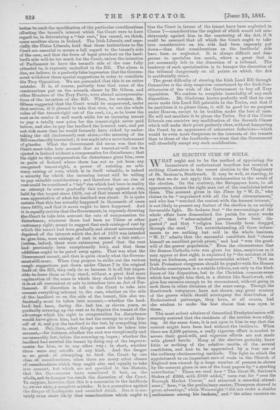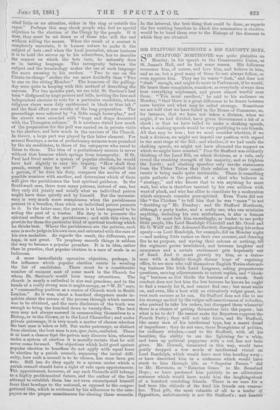AN ELECTIVE CURE OF SOULS.
WHAT ought not to be the method of appointing the Incumbents of ecclesiastical benefices has received a striking illustration in the recent election to the Chaplaincy of St. Saviour's, Southwark. It may be well, at starting, to say that we do not apply this condemnation to the result of the election. On the contrary, the Ratepayers have, to all appearance, chosen the right man out of the candidates before them. The account given in the Times by "W. D.," who claims to be " acquainted with all the local circumstances," and who has " watched the contest with the keenest interest," is not likely to present any feature of the election in an unduly favourable light. He declares that "the surroundings of the whole affair have demoralised the parish for many weeks past ;" that 64 sober-minded persons have been dis- gusted ;" and that "religion has literally been dragged. through the mud." Yet notwithstanding all these induce- ments to see nothing but evil in the whole business, "W. D." admits that the successful candidate had "shown himself an excellent parish priest," and had " won the good- will of the poorer population." Even the circumstance that the Roman Catholic vote was given for him, suspicious as it may appear at first sight, is explained by "the accident of his being an Irishman, and no controversialist withal." That an Irish Protestant clergyman should be popular with his Roman Catholic countrymen is a notable tribute, not only to the kind- liness of his disposition, but to the Christian common-sense which has taught him that, in a district like Southwark, reli- gion has enemies enough to be encountered, without going to seek them in other divisions of the same camp. Though the Southwark ratepayers have not shown auy groat mastery of the graces which should accompany the distribution of Ecclesiastical patronage, they have, at all events, had the wisdom to make the best choice that was open to them.
The- most ardent admirer of theoretical Presbyterianism will scarcely contend that the incidents of the contest were edify- ing. At the same time, it is not open to him to say that the contest might have been had without the incidents. When there are 2,200 patrons, a really vigorous effort is needed to secure their good-will, and vigorous efforts are not made with gloved hands. Many of the electors probably knew little or nothing of the relative • merits of the several candidates, and had to be approached by a free use of the 'ordinary electioneering methods. The light in which the appointment to an important cure of souls in the Church of England was viewed by a large number of persons is shown by the account given in one of the local papers by "a sporting contributor." There we read how The Great St. Saviour's Stakes of £600, with £100 added," were run for "over the Borough Market Course," and attracted a crowded attend- ance;" how, "in the preliminary canter, Thompson showed to great advantage," while Wainwright "did not evolee a similar enthusiasm among his backers," and." the other runners ex-
' cited little or no attention, either in the ring or outside the ropes." Perhaps this may shock people who feel no special objection to the election of the Clergy by the people. If it does, they must be set down as of those who will the end without willing the means. When the result of a contest is completely uncertain, it is human nature to make it the , subject of bets ; and when the local journalist, whose business it is to hold the mirror up to his subscribers, has to describe
i the contest on which the bets turn, he naturally does so in betting language. The incongruity between the subject and the terminology makes the use of such language the more amusing to his readers. "Two to one on the Curate-in-charge" strikes the ear more decidedly than "Two to one on the sitting Member." The humours of the polling- day were quite in keeping with this method of describing the canvass. For two months past, we are told, St. Saviour's had boon" disfigured by huge posters and bills, inviting the free and independent electors to vote for a particular candidate, whose ieligious views were duly emblazoned in black or blue ink ;" and the final effort was worthy of the long preparation. The proceedings were relieved by "a little rough horse-play," and the streets were crowded with "traps and drags decorated with the Thompson colours." It is nowhere stated how much of the preparation for the poll was carried on in private visits to the electors, and how much in the services of the Church. In theory, a large part was played by this latter element. For several Sundays, a series of probationary sermons were preached by the six candidates, to those of the ratepayers who cared to listen to them. The idea of a probationary sermon is never without that humour which springs from incongruity. If St. Paul had lived under a system of popular election, he would have had slightly to vary his inquiry, "How shall they
preach, except they be sent ?" It may be objected that a patron, if he does his duty, compares the merits of one possible nominee with another, and determines which of them will give the parishioners the best spiritual guidance. In the Southwark case, there were many patrons, instead of one, but they only did jointly and noisily what an individual patron might have done quietly and by himself. But the inconsist- ency is very much more conspicuous when the parishioners present to a benefice, than when an individual patron presents to it. In the latter case, the patron is at least supposed to be acting the part of a trustee. His duty is to promote the spiritual welfare of the parishioners ; and with this view, to provide for them the particular kind of spiritual teaching which he thinks best. Where the parishioners are the patrons, each man is made judge in his own case, and entrusted with the cure of his own maladies. As regards • the result, the difference, per- haps, is not groat. To prophesy smooth things IS seldom the way to become a popular preacher. It is in idea, rather than in practice, that popular election to a cure of souls is so ludicrous.
A more immediately operative objection, perhaps, is the influence which popular election exerts in weeding the list of candidates. There must be a considerable number of eminent men of some mark in the Church for whom St. Saviour's would have many attractions. The church is nearly a cathedral in size and grandeur, and in the hands of a really strong man it might occupy, as "W. D." says, a "commanding position as a centre of Church work in South London." As it was, about a hundred clergymen made in- quiries about the nature of the process through which success was to be obtained, and the mere disclosure of the truth was enough to bring the hundred down to twenty-flve. The best men may not always succeed in commending themselves to a Bishop, or to the Crown, or to the Lord Chancellor ; and under private patronage it is very much a matter of chance whether the best man is taken or left. But under patronage, as distinct from election the best man is not, ipso facto, excluded. There is at least a Chance that the patron may discover him, whereas under a system of election it is morally certain that he will never come forward. The objections which hold good against popular election to benefices do not apply with equal force fel election by a parish council, supposing the initial diffi- culty, how such a council is to be chosen, has once been got Over. Still less do they apply to a system under which a parish council should have a right of veto upon appointments. The appointment, however, of any such Councils still belongs tb a highly problematical future, and the author of the last attempt to establish them has not even emancipated himself from that bondage to the national, as opposed to the congre- gational idea, which is evidenced by his adherence to the rate- payers as the 'proper constituency for electing these councils. In the interval, the best thing that could be done, as regards the few existing benefices in which the nomination is elective, would be to hand them over to the Bishops of the dioceses in which they are situated.




















 Previous page
Previous page